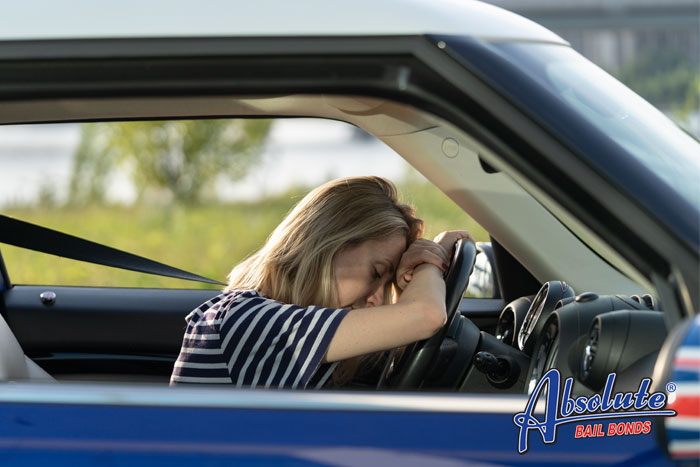
Sleep-deprived Driving
Most of us have heard so much about the dangers of drinking and driving that we would never dream of sliding behind the wheel after consuming alcohol. Yet, we seldom think twice about going for a drive while we’re tired.
The truth is that while there aren’t any actual laws about sleep-deprived driving, the action is very dangerous. The United States Department of Transportation reports that in drowsy driving incidents resulted in nearly 700 deaths during 2019. It’s impossible to know exactly how many actual accidents were the result of drowsy driving.
We know that alcohol dulls our senses and makes it difficult to react appropriately when things start to unwind. The same is true when we’re tired. All it takes is a single driver hitting the brakes or turning in front of you for an accident to happen. While fully alert, you might have been able to avoid a collision, but when you’re sleep-deprived, you react too slowly, or worse, fail to even realize that you need to react at all.
The other problem with sleep-deprived driving is that sleep deprivation, like alcohol, can cause you to make poor decisions. This poor decision can lead to reckless driving behavior that makes you a danger to yourself and everyone else.
The biggest danger of drowsy driving is that you’ll fall asleep. All it takes is closing your eyes for a second and dropping off. At this point, your car is operating all by itself. You can drive off the road, collide with another car, change lanes so you’re heading the wrong way. Falling asleep at the wheel has resulted in numerous fatal car accidents.
Don’t assume that you can use caffeine to stay awake while you’re behind the wheel. The only way to truly prevent being the cause of a drowsy driving incident is to make sure you are fully awake and alert each time you hit the road. If you’re tired, postpone your trip and take a nap. Being late is far better than the alternative.
If you feel yourself getting tired while you’re in the middle of a commute, don’t try pushing through the fatigue. Instead, find a safe place to pull off the road, such as a gas station or grocery store parking lot. Lock your doors and try to take a nap.
If your drowsy driving leads to an accident, you could be ticketed for reckless driving plus other moving violations. If someone is hurt or killed during the incident, you could find yourself facing vehicular manslaughter charges as well as a civil lawsuit.

Failure to Pay Legal Child Support Obligations in California
Child support is always a touchy issue. There are a variety of reasons people use for failing to pay legal child support obligations in California. These reasons include:
- That the amount is more than they can afford and they don’t have enough money left to live on
- They don’t think their ex (or kids) are entitled to the money
- They spent the money on other things
- They paid the money but it has gotten lost in the system
The first thing you have to understand is that once the court has ordered a specific amount of child support to be paid, that is it. You are expected to make the complete payments and the payments should be made on time. Failing to do so is breaking the law.
If you can’t afford to pay the child support or if situations have changed and you no longer feel that the amount you’re paying is fair, you need to contact the court immediately and arrange to have your case reviewed. Until the review happens and the child support order is formally changed, you still have to make the current payments. Failing to keep up with the payments, even when the matter is being discussed, will result in legal action.
Don’t assume that just because you spent the money on something else and no longer have access to the funds, that you won’t have to worry about any legal actions. Not having the money available is not considered a valid reason to fall behind on your child support payments.
If you no longer have the money because of an employment change, medical emergency, or another kind of emergency, it’s in your best interest to alert the court system immediately so they can evaluate your case. Taking a proactive stance is the best way to avoid legal trouble.
The simple truth is that sometimes the system doesn’t work and child support payments become lost. This is why it’s so important to document everything so that you can prove the missing payments weren’t your fault, but rather a clerical error. Don’t assume that because the child support payments you made were lost that you can stop making payments. You still have to submit your child support payment on time until the missing payments are found and reimbursements are made.
The legal consequences of failing to pay child support are quite severe. The state could decide to suspend not only your driver’s license but also any professional business licenses you might rely on to make a living. In severe cases, the state could decide that your failure to pay the court-ordered child support is a contempt of court, which could result in serving jail time.
When all is said and done, it’s in your best interest to make every single child support payment on time and in full. If you’re unable to do so, notify the courts immediately.

Be Prepared to Ask Your Bail Bonds Agent Some Questions
No one plans to be arrested, which means no one sets aside money to use as bail. Since no one keeps a savings account specifically for bail money, when you are arrested, you’ll likely need the services of Absolute Bail Bonds.
We don’t believe that the consultation should be a one-way conversation during which we ask all the questions and you provide answers. We want you to be comfortable with us which is why we encourage you to ask plenty of questions.
How Long Before You’re Released From Jail?
We think you should know how long it will take us to submit the bail bond and get you released from jail. Not only should you know that we’re going to work quickly, but you’ll also need to arrange for a ride home and maybe let your employers know that you’re going to be late getting to work.
The answer will depend on a few variables. We can assure you that as soon as you sign our bail bonds contract, we’ll quickly start the process of getting you released. We will quickly arrive at the jail, bail bond in hand, and turn into the necessary paperwork. After that, the amount of time it takes depends on the booking officer.
How Much Money do you Owe?
As soon as we hear the amount your bail is set at, we can tell you the exact amount of money we require from you. In the meantime, we will say that is ten percent of the set bail amount is our normal fee. We do offer military personnel a 20% discount.
Do you Require Collateral?
This is an excellent question that we feel everyone should ask. The answer depends on your history, the charges filed against you, your community ties, and how high your bail was set. In most cases, we don’t require collateral from working signers, though there is the occasional exception.
If you or one of your loved ones has been arrested, contacting Absolute Bail Bonds in Lancaster is the fastest and easiest way to get them released.
Feel free to call 1-800-793-2245 or click Chat With Us now for an obligation-free consultation.

The Unlawful Taking of Pictures and Video Recording
Thanks to built-in cameras on smartphones, most of us have a camera at our disposal 24/7. We’re able to record everything. We use the phone camera for selfies, points of interest, and to record the actions of others. We’ve grown so accustomed to taking photos and videos of everything that we rarely stop and think about the fact that there are certain times, places, and situations when taking pictures and video recordings is actually against the law.
Learning that there are cases where a person has broken the law with videos or photos they’ve snapped can make you have second thoughts about using your camera. The good news is that the odds are pretty good that you’re not going to record anything that will break the law. Both federal and state laws are written in a manner that allows you to legally take a photo of anything that’s plainly visible. You’ll be pleased to learn that this includes federal buildings and even police officers who are working.
You’re also legally allowed to take photos and videos of things that can be seen from public property. For example, as long as you can do so from the road, you’re allowed to photograph an interesting-looking barn.
If you’re on private property, the property owners get to make rules about what you can and can’t take photos/videos of. For example, if snapping a few shots of the barn requires you to walk across a private hayfield and jumping a fence, the property owners could insist that you destroy the images and also file trespassing charges against you. The same is true if you walk up to someone’s house and start snapping pictures or videos through their windows. You’re not legally allowed to take photos or videos of a person (or their belongings) if the property owner had a reasonable expectation of privacy.
If you’re caught taking photos or videos in an area where the property owner had a reasonable expectation of privacy, they can file invasion of privacy charges as well as trespassing charges against you. If you’re convicted of invasion of privacy, the judge could sentence you to up to six months in a county jail and order you to pay a fine of $1,000. If this isn’t the first time you’ve been convicted of invasion of privacy, the sentence could double.
The best way to avoid getting into trouble while you shooting pictures or videos is to make sure you’re feet are always firmly planted on public property.

Probation and Parole. What’s the Difference?
If you’re confused about the difference between probation and parole, you’re not alone. Most people don’t really know what the difference is between the two until they get into trouble with the law.
While you’re on probation, you’re still technically in police custody, but you have a great deal more freedom than you’d enjoy if you were in jail. There will be some rules attached to your probation, breaking any of these rules will result in you losing your probation status and being locked in a cell. One of the big things you’ll have to do is routinely meet with your probation officer who will insist that you prove you’re following the rules.
Many people are put on probation without ever seeing the inside of a jail cell.
Parole is both similar to probation and different. The best way to think about parole is that it is kind of like is a kind of parental supervision. It’s sort of like that stage where sorta living on your own but still relying on your parents. When you’re granted parole, the parole board is saying that while you no longer have to be in jail, you’re also not ready for total independence.
Legally speaking, parole is a conditional release from prison. It is a way of getting out of prison even though you still have some time left to serve. Other than the fact that you have spent time in prison, parole and probation are very similar. Though the rules of parole are sometimes stricter and you sometimes have to work harder to prove that you should be granted parole. One of the big issues connected to parole is admitting your guilt and showing that you understand why your actions were wrong.
It isn’t unusual for restrictions and requirements to be attached to both parole and probation, though those restrictions vary from one case to the next. In most cases, people who are serving both parole and probation will have their travel restricted, will have to submit to drug (and sometimes alcohol) testing, are sometimes required to attend counseling sessions, are sometimes required to be at home during specific times of the day/night, and will sometimes be electronically monitored.
If you are serving either probation or parole, it’s important to remember that you haven’t been given a get out of jail free card. A single misstep, even a little one, could result in your being incarcerated.

